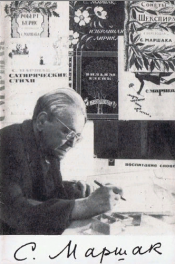
The Presidential Library marking the 135th anniversary of Samuil Marshak
November 3, 2022 marks the 135th anniversary of the birth of Samuil Marshak, a well-known Russian poet, translator, playwright, screenwriter and literary critic.
Marshak is one of the most famous authors of books for children. An absent-minded man, Mr. Twister, a silly mouse, a master-lomaster and other bright characters in his poems are familiar to everyone from childhood.
In the preface to the set of postcards “S. Marshak" (1977), which is available in the electronic collections of the Presidential Library, the son of the poet Immanuel Marshak, a world-famous physicist and translator of Jane Austen's novels, said: "If you can characterize my father with one concept, I would choose movement. There was nothing of inertia, stagnation, boredom in him. He knew how to “wind up” the mental mechanism of people, to break their passivity with work, humor, joy-play or love-care. According to Immanuel Marshak, at the celebration of his 75th birthday, his father told his friends: “Boredom is a yawn of nothingness. Here is Pushkin - this is the highest being, life... I wish you the main thing - being!”
Samuil Marshak was born in Voronezh in 1887. At the age of 15, he moved to St. Petersburg, where he met art and music critic Vladimir Stasov, who soon wrote: “Yes, this boy, if he lives and does not go off the rails, there will be something big!” The meeting changed the whole future life of the future poet. Stasov introduced him to Maxim Gorky, in whose family then Marshak lived for two years.
After the revolution, Marshak created the "Children's Town" in Krasnodar, a haven for orphans: a school, circles, workshops and a children's theater. It was here that Marshak developed his principles of artistic creativity for children, based on respect for the child and his participation in the artistic process.
Already in Leningrad, Marshak created the children's almanac "Vorobey" (later - "Novy Robinson"), which published such masters of literature as Vitaly Bianki, Evgeny Schwartz, Boris Zhitkov. Over the years, he led the Leningrad editorial office of Detgiz, Lengosizdat, the Young Guard publishing house, he had to work a lot with authors, and often in conversations with him, writers had ideas for their future books. Marshak was even called the "editor of plans".
During the Great Patriotic War, Samuil Marshak's poems regularly appeared on the pages of central and front-line newspapers; in collaboration with the Kukryniksy, he worked on battle posters. The Presidential Library’s portal features one of them “The Martens Need Scrap”, 1942.
Marshak and Kukryniksy transferred the state awards they received in 1942 for anti-fascist poems and posters to the construction of the Besposchadny heavy tank.
The Kukryniksy also illustrated his collection of satirical poems "Black and White" of 1945, which is available in the Presidential Library. In the book the poet caustically ridicules the Fuhrer and his hordes defeated in Russia and Europe.
Marshak was engaged in translations, attaching great importance to them. At the Shakespeare Convention in Stratford in 1957, he motivated his commitment to the cause of poetic translation as follows: “Art has a magical ability to overcome the barriers of race, nationality and tradition, making people aware of their worldwide brotherhood. The scientific, technical successes of a people win him respect and admiration, but the creations of art make everyone fall in love with this people”.
Marshak translated all 154 Shakespeare's sonnets. He made up to 20 versions of each translation, the 55th sonnet was translated for six years. He worked on a collection of translations of his favorite poet of the 18th-19th centuries, William Blake, for half a century. It is in his translations that we know the songs and ballads of Robert Burns, the poems of William Wordsworth, John Keats, Rudyard Kipling and others.
In the last two decades of Samuil Marshak's life, another direction of his work arose: a direct conversation with a "talented reader" (a term introduced by the poet himself) - about ethical, aesthetic and artistic views, integral perception of the world. During this period, the books "Education by the Word" and "At the Beginning of Life" were created, combining articles, notes, memoirs of the author, "Selected Lyrics" and others.
In 2003, at the initiative of the Union of Writers of St. Petersburg and its section of children's literature, the Marshak All-Russian Literary Prize was established. The first award took place in 2004. The purpose of the award is to identify and reward the most talented poets and writers of Russia who create literature for children.

